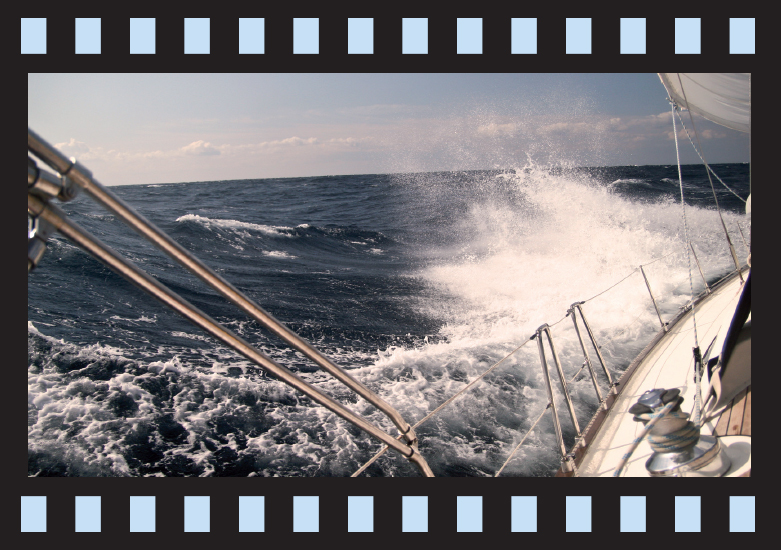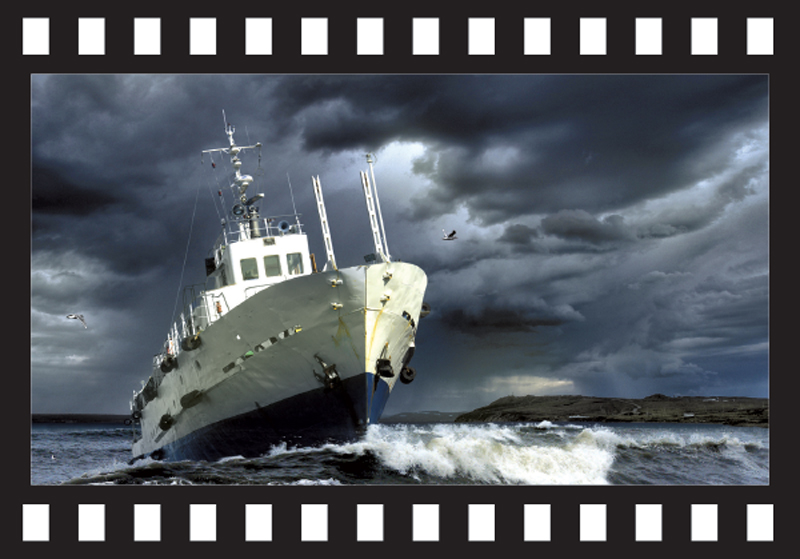 My first encounter with an ocean storm came on my passage from India to the U.S. on the Fulbright exchange program. I sailed from Bombay on an ancient P&O liner that had been in service before the First World War. There were no luxuries, but I enjoyed the trip because of the variety of passengers – from empire builders to scholars from the Far East – and the everchanging beauty of the sea.
My first encounter with an ocean storm came on my passage from India to the U.S. on the Fulbright exchange program. I sailed from Bombay on an ancient P&O liner that had been in service before the First World War. There were no luxuries, but I enjoyed the trip because of the variety of passengers – from empire builders to scholars from the Far East – and the everchanging beauty of the sea.
July in the Arabian Sea is monsoon season, and three or four days out our little ship began to be tossed like a toy by winds and rain. A storm is a great equalizer. All distinctions of class and color were swept away. Empire builders hung at the railings side by side with Asian academics, clutching identical brown bags. All of us cheered with relief when the weather passed and we were obliged to put in at Aden for repairs.
Sailing from Cherbourg to New York on H.M.S. Queen Mary was an utterly different experience. The Queen Mary too was nearing retirement age. But she was fast, and positively luxurious by comparison with that P&O vessel. When we hit rough seas on the Atlantic, we sailed through majestically without a roll.
“Why aren’t we being tossed about?” I asked an officer. “Is it because of the ship’s size?”
“No,” he said proudly, “it’s the stabilizers. We installed them a couple of years ago. Now rough waters don’t bother her at all.”
I often recall those two journeys to illustrate one of the most important truths I have ever learned. Like a storm, life is a great equalizer. It does bring sunny days, but it is sure to bring storms as well. And regardless of class, color, status, birth, or wealth, some of us sail through smoothly and some flounder and even go under.

Few human beings are born with the ability to weather storm and stress with grace. But everyone can learn. We can’t control the weather outside, but we can control how we respond. Like the Queen Mary, we can install stabilizers where we need them – not outside ourselves, of course, but in the mind.
For it is in the mind that the storms of life really blow. What matters is not so much the turmoil outside us as the weather within. To a person with an agitated mind, something as minor as a rude driver can cause enough stress to ruin a day. By contrast I think of Mahatma Gandhi, who gave himself away when he confessed, “I love storms.” Gandhi began life as a timid child, but he learned to keep his mind so steady that he could face tremendous crises with courage, compassion, wisdom, and even a sense of humor.
This steadiness of mind is one of the most practical of skills. Without it, no one can face the storm and stress of life without breaking. And life today is storm and stress. We live in the midst of conflicts – within ourselves, at home, in the community, even nationally and internationally. This is an age of conflict, which makes it an age of anxiety as well. Nothing is more vital than learning to face this turmoil with clarity, confidence and grace.
Fortunately, we don’t have to develop these capacities. We already have them. The problem is that we need a calm mind to draw on them. When the mind is agitated or confused, they’re simply locked up inside. That is the practical importance of a calm mind.
“Wait, You Know How to Meditate!”
Here I’d like to tell another story about that first voyage.
By the time I left India, I had been meditating for many years and never missed a day. So the first thing I did on boarding the ship was to find a place for morning meditation where I would not be disturbed. Since my cabin was impossible – too cramped and crowded – I prowled about until I discovered the sports deck. No one ventured there until the crew showed up with mops and pails.
On the first morning I made my way to the sports deck in the early hours and settled down for deep meditation. When I finished and opened my eyes, I found myself surrounded by a number of young Australians making cracks at my expense. I didn’t mind. If I could provide some entertainment on a boring voyage, I thought, so much the better.
The next couple of days began the same way. But when the monsoon struck and the view started gyrating wildly between sky and sea, my stomach began to follow. I made it through the day, but the next morning I awoke with the sinking sensation that my time had come. My first impulse was to grab a brown bag and join the majority draped over the railings.

But then a second thought popped in. “Wait, you know how to meditate!”
Somehow I managed to reach the sports deck without incident and sat down for meditation. For a while it was touch and go. But then my mind settled down, and I got absorbed in what mystics call the “sea of peace” within. When I opened my eyes a couple of hours later, my stomach had stopped complaining. It had calmed down along with my mind. I felt on top of the world. With the ship still pitching wildly, I sauntered as best as I could into the dining room and sat down to a first-rate breakfast – in solitary dignity, monarch of all I surveyed.
“Like a storm, life is a great equalizer. It does bring sunny days, but it is sure to bring storms as well. And regardless of class, color, status, birth, or wealth, some of us sail through smoothly and some flounder and even go under.”

The purser looked on in awe. When I rose to go, he approached with new respect and asked in a conspirator’s whisper, “What tablets do you use?”
I wanted to say, “Not medication. Meditation.”
The storms are not outside
Fascinatingly enough, so far as the mind is concerned, the cause of stress is not important. What matters are the waves of agitation in the mind. Whether we are anxious, panicky, angry, afraid, or simply out of control, the mind is doing the same thing: heaving up and down like the sea.
This is a precious clue. It means that we don’t have to prepare for one kind of crisis in this way and another in that way. All we have to do is learn to steady the mind.
We learn this with little challenges – the thousand and one daily irritations that upset us even when we know they aren’t worth getting upset over. Life graciously provides us with innumerable little incidents like this, which, instead of irritants, can become opportunities for spiritual growth. If you go on taking advantage of them as they arise, you can gradually raise your threshold of upsettability higher and higher.
But whatever popular psychology says, it’s not all “small stuff.” Coping with these annoyances is just training. The Olympic events are the crises and tragedies – accidents, illness, separation, betrayal, bereavement – that are bound to come in one form or other without warning. That is when we need to know how to find shelter in ourselves, for that is just when external supports are likely to fail.
Teresa of Avila, one of the world’s greatest teachers, illustrated this idea of shelter inside us with a famous image. All of us, she says, have a rich and spacious “interior castle” – an inner world that is our real home. Everything we need is stocked there for us to claim. But until we begin the spiritual life, we spend our lives in the courtyard and never even dream of trying the door.
Imagine owning a house without an inkling that it belongs to you. You eat your meals on the porch, sleep there, work there, play there, and never think you’re missing anything. Inside you have a comfortable bedroom and a den with a cozy fireplace, but you’re used to your sleeping bag. When it rains, you huddle on the porch and shiver. And if someone asks why you don’t go inside, you reply, “What’s ‘inside’? I’ve lived like this all my life. What else is there?”
The vast majority of human beings live very much like this. Until we learn how to enter the deeper levels of consciousness – as John Donne says, to “be our own home and therein dwell” – we are hopelessly exposed to every storm life brings.
Not insensitivity
When I talk about being steady in a crisis, I’m not talking about insensitivity. When life strikes serious blows – personal trauma, a death in the family, earthquake, war – no one should be indifferent or feel at ease. In such cases, agitation is only human. What is important is not to be at the mercy of that agitation: to stabilize the mind quickly, so that you can respond to the crisis effectively with courage, love and wisdom.
When you try to meditate at such times, you can almost see your mind surging up and down like a stormy sea. And what you are doing is telling the waves of the mind, “Be still.” It takes a lot of practice, but gradually the waves rise less and less until finally they subside.

There is nothing unnatural about this stabilizing process. No matter how hard life strikes, almost everyone regains balance sooner or later. The difference is that when the mind is untrained, we might need days or even weeks to recover. Once you begin to train your mind to be steady always, it takes less and less time to get on an even keel again. Finally, like a good helmsman, you will not lose your hold on the wheel even in the roughest sea.

Most precious, perhaps, is how this stabilizing influence affects others. Just as an agitated person disturbs those around him, one person with an even mind helps others to find the same equilibrium in themselves. You not only develop stabilizers in your own mind, you become a stabilizer for others too.
“That period can be painful, and even after your mind regains equilibrium, the sorrow may remain. But by then your mind is clear.”
“Great emergencies and crises,” the psychologist William James observed, “show us how much greater our vital resources are than we had supposed.” This is the opportunity that crisis and challenge offer us. You and I may not be Gandhis, but every one of us has these capacities inside us. That is our legacy as human beings.
 Eknath Easwaran (1910-1999) is respected around the world as the originator of passage meditation and an authentic guide to timeless wisdom. An Indian professor of English literature and a writer and speaker, he came to the U.S. in 1959 and founded the Blue Mountain Center of Meditation in 1961. The centre carries on his work today through publications and retreats. bmcm.org
Eknath Easwaran (1910-1999) is respected around the world as the originator of passage meditation and an authentic guide to timeless wisdom. An Indian professor of English literature and a writer and speaker, he came to the U.S. in 1959 and founded the Blue Mountain Center of Meditation in 1961. The centre carries on his work today through publications and retreats. bmcm.org






